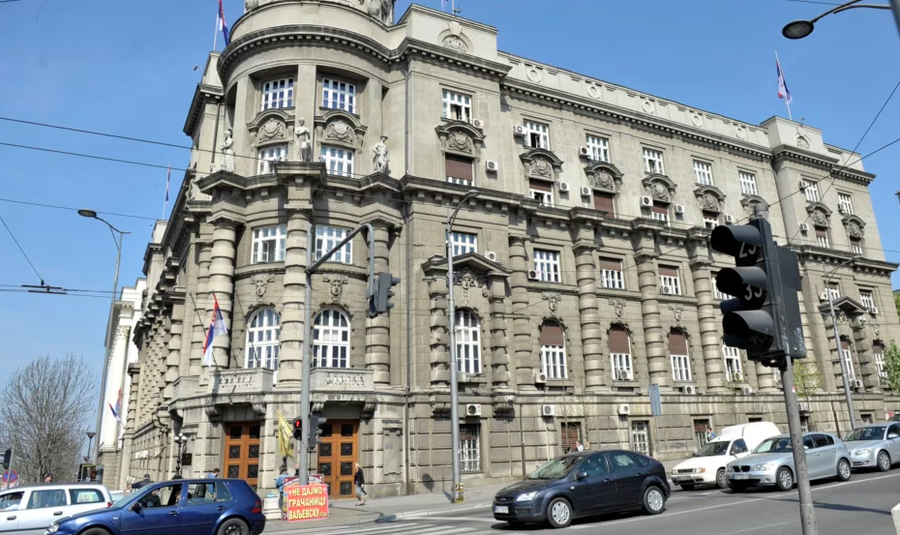
From praise for how a non-partisan figure will promote dialogue in society, to assessments that he will lead a unified Government and carry out the orders of the President of Serbia, Aleksandar Vučić - these are the reactions to the appointment of doctor Đuro Macu as the mandate holder for the formation of the new Government of Serbia.
The acting Prime Minister, Miloš Vučević, declared on April 7 that Gjuro Macut and the new Government must bring new energy.
In an interview with Radio Television of Serbia (RTS), he said that Macut is a person "who can open social dialogue" because he is not burdened with "some things from the past period."
"I don't know if it's possible to reach a consensus, but I believe it's possible to have a conversation and dialogue. The solution doesn't lie in blockades and throwing eggs," Vučević said.
Asked if there are any signals that such a dialogue could happen, he said that this will be seen in the coming period.
"I believe that dialogue is possible and I am sure that it is necessary, but Serbia does not have much time to wait, it must move forward," said Vučević.
President Vučić announced on Sunday that endocrinologist Đuro Macut is the prime minister-designate for the new Serbian government. Macut is a member of the initiative council for the formation of Vučić's "Movement for the People and the State."
Vučić, in his address to the public, said that the new government will be elected by April 18 and that Gjuro Macut "will help a lot in calming tensions."
The Speaker of the Serbian Parliament, Ana Brnabić, stated on April 7 that Macut showed great courage in agreeing to lead the Government "at such a challenging moment."
She added that the candidate for prime minister "has proven with his life" that he is someone who learns quickly and is willing to work with dedication.
"What we need most is to have a calm, measured person, someone who is a man of dialogue," said Brnabic, emphasizing that he believes he will be an excellent prime minister.
On the other hand, the leader of the Freedom and Justice Party (SSP), Dragan Djilas, assessed that the appointment of a doctor with no political experience as prime minister "represents Aleksandar Vučić's attempt to gain time to stay in power."
In a written statement, he stressed that Gjuro Macut “has previously signed support for the Serbian Progressive Party list and spoken at party rallies,” and that he is “yet another convinced executor of Vučić’s will.”
"Such a Serbian government will be yet another form of Vučić's absolute power, deprived of legitimacy, control and responsibility," the SSP leader assessed.
The leader of the New Democratic Party of Serbia (NDSS), Miloš Jovanović, said that the appointment of Đuro Macu is a "crew change on the Titanic" led by Serbian President Aleksandar Vučić.
"It is clear that such a government will not be able to avoid the flood, much less resolve the deep political and social crisis in which Serbia finds itself," Jovanović declared.
The opposition party Central Serbia assessed on April 6 that for the citizens of Serbia it is completely irrelevant whether the head of the government is Prime Minister-designate Đuro Macut, current Prime Minister Miloš Vučević or former Prime Minister Ana Brnabić.
In its statement, this party emphasizes that "it is clear to everyone that the President of Serbia, Aleksandar Vučić, is the real leader."
The informal group of intellectuals "ProGlas" assessed that the appointment of the mandate proves that the Serbian president has made a decision "for a government of continuity."
Academician of the Serbian Academy of Sciences and Arts (SANU), Vladimir Kostic, said on April 7 at the “ProGlas” roundtable that in recent months “all social groups have come together to express disagreement with the situation in Serbia.”
"According to data from the non-governmental organization CRTA, 452 protests and 128 rallies were held last week alone. Despite all this, the president has decided not to listen and not to speak about the demands of the social majority, but has decided for a continuity government. We do not accept this continuity policy," said Kostić, one of the initiators of "ProGlas".
The President of Serbia previously held consultations with parliamentary parties on the new government's prime minister, which began on April 2.
The parliamentary opposition had previously warned that it would not participate in those consultations. They had proposed the formation of a transitional government, which was rejected by the government representatives.
The Serbian government has been in a caretaker mandate since March 19, when MPs in the Assembly verified Vučević's resignation from the post of prime minister, which marked the beginning of the 30-day deadline for forming a new government.
Vučević had resigned a month and a half earlier, following an attack by activists of the Serbian Progressive Party on a group of students who had blocked the work of the faculty in Novi Sad.
The fall of the Serbian government led by Miloš Vučević occurred at the height of anti-regime protests, led by students who have blocked dozens of faculties across Serbia since late November 2024.
At the center of their demands, presented to Serbian institutions, is the determination of legal and political responsibility for the deaths of 16 people from the collapse of the shelter at the Novi Sad Railway Station on November 1 last year./ REL (A2 Televizion)











